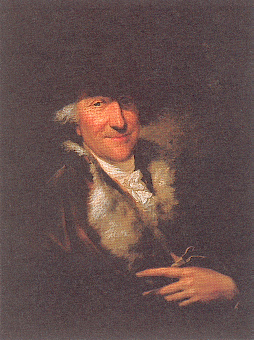

German composer; eldest son of J. S. and Maria Barbara Bach. As a youth he received the best possible musical education from his father, who composed a Clavier-Büchlein and the first volume of the Well- Tempered Clavier chiefly for his use. From 1729 to 1733 he studied mathematics and philosophy at Leipzig. In the latter year he accepted a post as organist in Dresden (Sophienkirche), and in 1746 a better position in Halle (Liebfrauenkirche). He accompanied his father on the famous "Musical Offering" visit to Frederick II in 1747. Dissatisfied with employers and salary, Friedemann resigned his Halle post in 1764; he would never again hold a permanent job. After a brief period in Brunswick he moved his family to Berlin in 1774; upon his death he left a destitute widow and child. He composed more than forty keyboard works, seven concertos, chamber music, ten symphonies, thirty-three sacred cantatas, other vocal works.
Wilhelm Friedemann was a gifted organist and composer whose life ended in failure and poverty because he could not adjust to the contemporary requirements for a successful music career. Some of his works are conservative in style, like those of his great father and teacher; others pay tribute to the fashionable style gallant; but the outstanding features of his music are a certain freedom, even capriciousness in the details of harmony, melody and rhythm; sudden contrasts of mood; and, on occasion, an intensely personal, almost romantic emotion, which presages the nineteenth century.